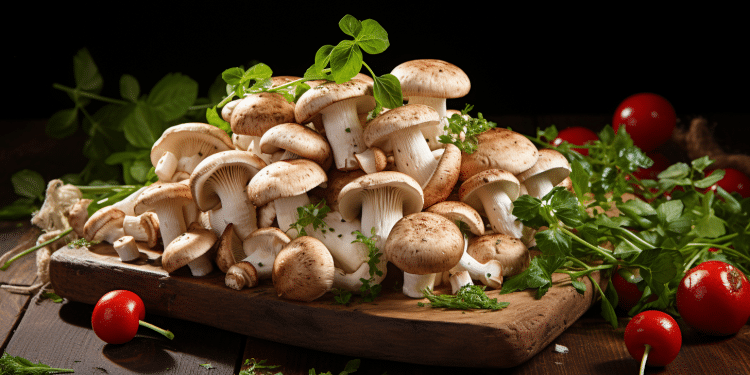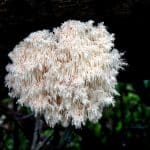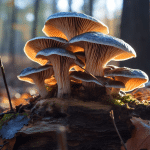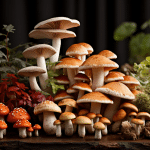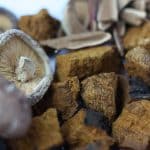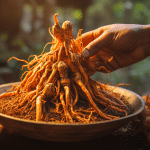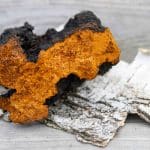Most people think of mushrooms as those beige-and-white, rubbery vegetables found in produce aisles, but the truth is that mushrooms are anything but vegetables. The USDA considers them a speciality crop, but they aren’t a fruit nor are they a plant. Rather, they are awesome fungi and mushroom nutrition has amazing health benefits.
Mushrooms are fat-free, cholesterol-free, gluten-free, and they have incredibly low levels of carbohydrates, calories, and sodium. They are also high in over a dozen vitamins and minerals, as well as being rich in antioxidants, all of which are essential for a strong immune system and good overall health.
Traditional Chinese medicine has used a wide range of mushrooms for their curative properties for centuries, but it is only in more recent years that Western cultures have awakened to the healing powers of edible mushrooms. Read on for more on the nutritional value of mushrooms, and why it is more important than ever to include these meaty fungi as a part of your everyday routine.
Mushroom Nutrition Details | Vitamins, Minerals, and Anti-Oxidants
Mushrooms have some serious punches when it comes to vitamins and minerals, including zinc, magnesium, copper, potassium, selenium, phosphorous, as well as an array of B vitamins and antioxidants. They are also a pretty good source of fiber. While the white button mushrooms are certainly the most widely consumed, it is wise to eat different types of mushrooms as their mushroom nutrition content varies depending on variety.
Do Mushrooms Have B Vitamins?
Mushrooms are high in B vitamins, which directly affect energy levels, brain function, and cellular health, and therefore have a major role to play in immune health and wellbeing. Thiamine (B1) and riboflavin (B2) enable the body to use carbohydrates as energy. Niacin (B3) is beneficial to the digestive system, and pantothenic acid (B5) is an essential nutrient for the nervous system. Folate (B9) helps in forming red blood cells, while cobalamin (B12) helps make DNA and contributes to healthy body cells. As it turns out, mushrooms are one of the only natural, non-animal, dietary sources of B12.
Learn more: Mushroom growing supplies
This is particularly the case for dried shiitake mushrooms: Researchers found this variety, along with black trumpet mushrooms, gold chanterelle mushrooms, and lions mane mushrooms, contain significantly higher amounts of B12. More importantly, many vitamins and minerals found in mushrooms are antioxidants (selenium, for instance) that combat free-radical damage to cells. This is important because too many free radicals in the body can cause oxidative stress, which has been linked to increased risk for strokes and chronic diseases like cancer, heart disease, and Alzheimers, among others.
Is There Vitamin D in Mushrooms
Mushrooms are said to be the only vegetable foods capable of producing vitamin D. Unlike plants, mushrooms have no chlorophyll and do not require sunlight for growth. However, when mushrooms are exposed to UV light, whether it is through natural sunlight or artificial light, they contain a higher quantity of vitamin D, especially d2. Some commercial mushroom farmers now offer mushrooms that are vitamin D-induced by UV light, but wild mushrooms like chanterelles and morel mushrooms are higher in vitamin D because they are grown and harvested under natural sun exposure. While “sunshine vitamins” have long been associated with stronger bones, recent developments suggest that vitamin D in mushrooms may also suppress the production of cancer cells, helping to regulate cell growth.
Do Mushrooms Have Antioxidants?
Much has been made of the antioxidants found in mushrooms, and with good reason. All mushrooms provide an array of nutrients, but antioxidant levels differ depending on the species. Button mushrooms and Portobello mushrooms contain the lowest antioxidant amounts, while wild mushrooms, including Shiitake, Maitake, and Oyster mushrooms, boast higher amounts.
A recent study showed mushrooms, especially porcinis, are a powerhouse of the pair of anti-oxidant amino acids known as ergothioneine and glutathione. Together, they reduce inflammation in the body and combat the free radicals associated with a number of harmful health conditions. The scientists leading the research concluded that no other foods come even close to mushrooms as dietary sources of these antioxidants.
Do Mushrooms Have Protein
Mushrooms are not quite as high in protein as meat or fish, but they do provide comparable (and sometimes better) amounts of it compared to many conventional vegetables.
- Sliced button mushrooms = 2.97 grams per cup
- Asparagus = 2.90 grams per cup
- Avocado (medium) = 2.67 grams each
- Arugula = 2.57 grams per cup
- Chopped cauliflower = 2.05 grams per cup
- Okra = 1.93 grams per cup
- Broccoli rabe = 1.27 grams per cup
Clinical trials have also shown that the mushroom diet (regularly replacing meat with mushrooms) is an effective weight loss and management method. Not only do mushrooms offer the same hunger-satisfaction levels as meat, especially ones that have a meat-like, chewy texture, like portobello mushrooms, but they also help regulate blood sugar, as well as lower levels of cholesterol, blood pressure, and saturated fat.
Learn more: Mushroom spawn
Additional Medicinal Value of Mushrooms
Asian cultures have long recognized the seemingly magical, decidedly medicinal benefits of edible mushrooms. With over 200 species used in traditional Chinese medicine, they also understood the importance of diversity of mushrooms in order to maximize the benefits for health. Although the rest of the world has taken some time to catch up, a growing consensus, grounded, of course, in science, is that mushroom nutrition mitigates multiple forms of cancer in different stages. One study found that high intakes of mushrooms were associated with reduced risk for breast cancer, which is the second most common cancer in American women.
Other findings suggest that the sugars (aka beta-glucans) within mushrooms cell walls act as powerful immune-system boosters, particularly those found in shiitake mushrooms stems. In other clinical studies, it has been shown that triterpenes (chemical compounds) in the Lingzhi or Reishi mushrooms exert anti-inflammatory effects. Eating mushrooms regularly provides much more health benefits than many initially thought.
More than a pizza topping or a side dish, mushrooms are a superfood loaded with nutrients, antioxidants, and healing properties that may enhance your overall health and wellbeing when consumed regularly. While fresh mushrooms may provide the best benefits, powdered and dried mushrooms are a convenient and effective way to reap the same health benefits. There is so much more to discover about mushrooms nutrition, that science is really only beginning to scratch the surface. So, next time you are browsing the produce aisle of the grocery store, pick up a few of these funky-looking mushrooms and get eating for your health.
Updated 10/3/2022
